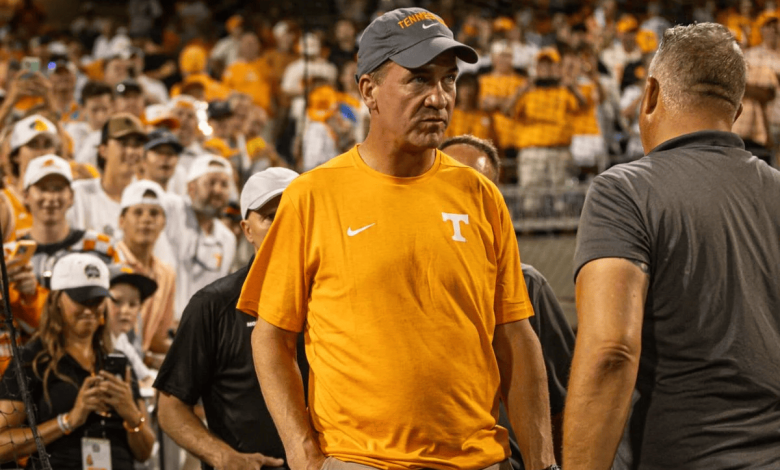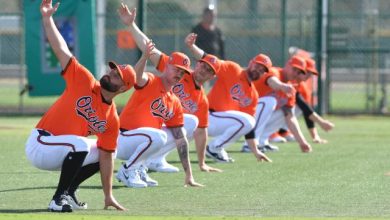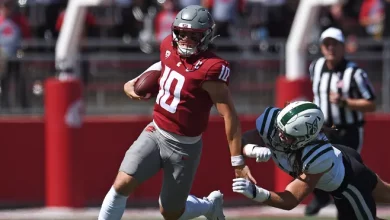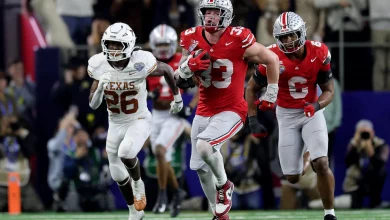Peyton Manning trolls his post-retirement career in SNL 50 cameo

Peyton Manning can be seen just about everywhere in his post-playing career. The former Tennessee star and one of the top 25 players in Tennessee football history retired from the NFL in 2015 after a Hall of Fame career.
Peyton Manning’s cameo during the 50th anniversary special of Saturday Night Live (SNL) was a moment that brought humor and star power together in the way only Manning, a two-time Super Bowl champion and one of the NFL’s most beloved quarterbacks, could. What makes this cameo so memorable is not just Manning’s fame, but how he used the platform to poke fun at himself, his career, and the unpredictable world of post-retirement fame.
Peyton Manning: The Football Legend
Peyton Manning is arguably one of the greatest quarterbacks in NFL history. His career spanned 18 seasons, primarily with the Indianapolis Colts and Denver Broncos. Known for his brilliant football mind and unparalleled ability to read defenses, Manning’s legacy was cemented with two Super Bowl victories, five MVP awards, and an extensive list of records. His retirement from the NFL in 2016 left a gap not just on the field, but also in the media and endorsement spaces, where Manning had already built a formidable presence.
Post-retirement, Manning transitioned into a media career, joining the ranks of other retired athletes who took on new roles in broadcasting and advertising. He hosted television specials, became a regular on commercials, and even dabbled in hosting duties, which helped maintain his visibility. But perhaps what stood out most was Manning’s ability to take a step back and embrace his off-the-field persona—one that was quirky, approachable, and self-aware. It was this self-awareness that would prove to be pivotal in his SNL 50 cameo.
The SNL 50th Anniversary Special
The SNL 50th anniversary episode was a star-studded event, filled with appearances from iconic alumni and unforgettable sketches that spanned across the decades. The show made sure to deliver high-profile cameos and moments of comedic genius, not just from former cast members, but from a wide array of celebrities, athletes, and politicians. Amidst the array of stars, Peyton Manning stood out as a surprise guest who stole the spotlight for a few minutes.
While he was not a regular fixture of SNL during his playing days, Manning had made appearances on the show before, including hosting the show in 2007. However, his role in the 50th anniversary special was different: he was not there to deliver lines or make fun of others. Instead, he was there to gently poke fun at his own post-retirement career, showcasing his sense of humor and ease with self-deprecation.
The Sketch: Manning’s Self-Deprecating Humor
The segment, which took place in the middle of the anniversary special, had Manning joining a group of former SNL hosts to participate in a sketch that cleverly riffed on his post-retirement life. It was a comedic take on how former athletes, particularly those as successful as Manning, often struggle to find their next act after hanging up their cleats.
The sketch opened with Manning awkwardly navigating a number of failed post-football ventures, from hosting a cooking show to being an overly enthusiastic pitchman for a brand of hot dogs. Manning, wearing a too-large apron in the kitchen, made exaggerated attempts at demonstrating his culinary prowess, causing chaos in the process. This over-the-top portrayal of the post-career struggle resonated with fans, both because of its absurdity and its grounded relatability.
While the physical comedy was hilarious, the underlying humor lay in how Manning was willing to make fun of his image. His transition from an iconic quarterback to a self-aware, slightly clueless former athlete trying to find his way in the entertainment industry mirrored what many celebrities experience after leaving the spotlight of their primary profession. Yet, Manning leaned into the absurdity of it all, never attempting to portray himself as anything other than a man enjoying a second act in his life.
The sketch also highlighted Manning’s recognition of the public’s perception of retired athletes. While some might struggle to transition or fear that their new endeavors won’t live up to the glory days, Manning showed that he was comfortable enough in his own skin to embrace the quirky and, at times, ridiculous nature of post-retirement fame.
Manning as an Entertainer
One of the reasons the SNL 50 cameo was so effective was because it illustrated Manning’s genuine comedic sensibility. Over the years, Manning had consistently shown that he wasn’t just an athlete; he was also a capable entertainer. His appearances in commercials—particularly those with his younger brother Eli Manning—proved that he had an impressive comedic timing and the ability to not take himself too seriously.
He often played the straight man in a lot of his comedic skits, allowing the humor to come from the way he interacted with others. In SNL, Manning flipped that role on its head, taking on a more exaggerated version of himself, but still with the grounded humor that made his previous commercial appearances so successful. The physical humor, such as attempting to flip pancakes with little success, was just as important as the self-aware lines he delivered.
Moreover, Manning’s history with SNL added an extra layer to the sketch. It wasn’t the first time he’d worked with the SNL team. His hosting gig in 2007 had already proven that Manning could handle the pressure of live television, delivering jokes and interacting with the talented cast. That experience served him well when it came to delivering a self-deprecating, hilarious portrayal of what life after the NFL might look like.
The Appeal of Manning’s Humor
There’s a distinct type of humor in seeing celebrities embrace self-deprecation, especially when they are as accomplished and revered as Peyton Manning. Athletes often have an aura of invincibility, particularly those who reach the upper echelons of their respective sports. However, in embracing a more vulnerable and relatable side, Manning proved that even the most decorated athletes are still figuring out life after the spotlight. It humanized him.
Fans of Manning also recognized the nods to his football career in the sketch. In one particularly funny moment, Manning was shown giving a half-hearted attempt to throw a perfect pass in the kitchen. The visual gag was both a reference to his career and a humorous commentary on how, even in the most mundane tasks, Manning’s desire for perfection and precision still clung to him. This kind of nuanced humor was exactly what made the cameo resonate so strongly with audiences.
Beyond the football references, there was a sense of familiarity that Manning brought to the screen. His warmth and approachability made it easy for viewers to buy into the sketch. They weren’t watching a former football player trying to force comedic moments, but rather a man who was genuinely willing to laugh at himself and have fun with the chaos of his post-football career.
The Cultural Impact
Manning’s SNL cameo also underscored a larger trend: the increasing intersection between sports and entertainment. As athletes continue to transition from their sports careers into media and entertainment, it’s important for them to strike a balance between maintaining their public personas and demonstrating their versatility. Manning did this effortlessly in his cameo, showing that his ability to entertain was just as sharp as his skills on the field. His embrace of comedy and humor also set the stage for more athletes to follow in his footsteps, demonstrating that success in sports doesn’t mean an end to a career in the limelight.
The sketch also brought attention to the nature of post-retirement celebrity culture. The transition from a public-facing career, especially one as high-profile as Manning’s, often comes with its own set of challenges. By poking fun at his own experience, Manning tapped into a universal truth that many people, not just athletes, face when they leave behind the world they once knew.









